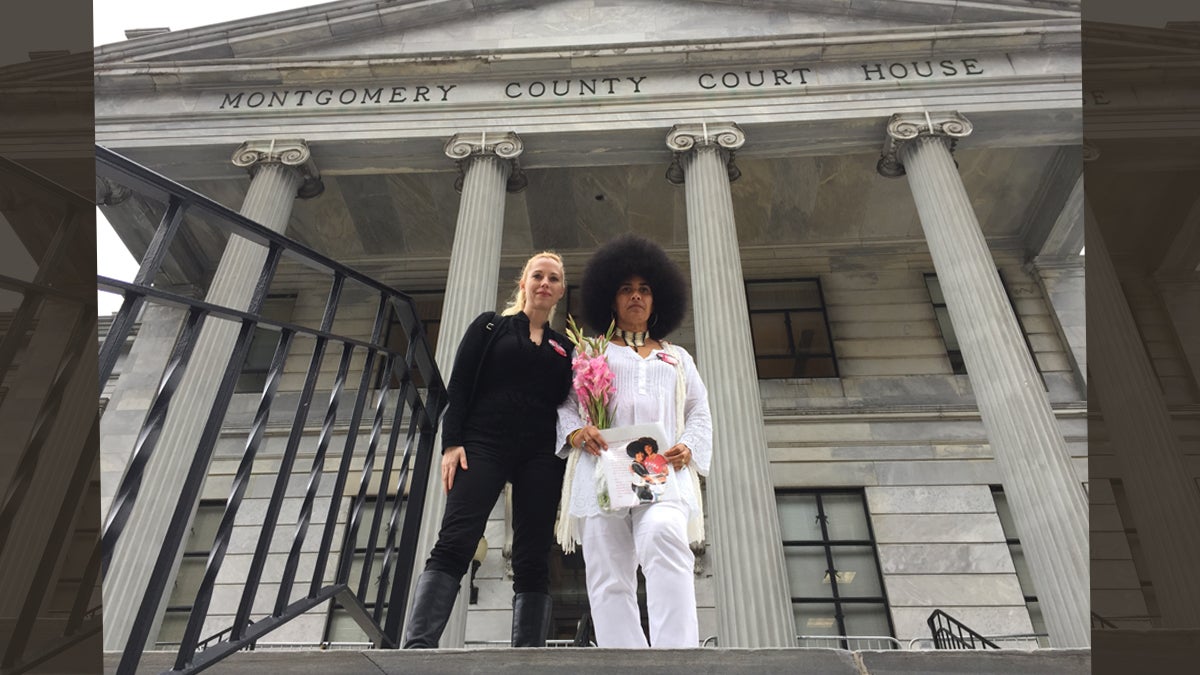Cosby accusers lead fight to end time limits for reporting sex assaults

Caroline Heldman, co-chair of End Rape Statute of Limitations, on left, and Lili Bernard, a Los Angeles-based actress and artist who has accused Cosby of drugging and raping her in the early 1990s. (Dana DiFilippo/WHYY)
For Caroline Heldman, it started in college.
As a Resident Director at Rutgers University, she found herself comforting a steady stream of broken young women who came to her after getting sexually assaulted. She could understand their pain better than most: She’d been raped too, as an undergraduate.
Her college experiences set the course of her career. She became one of the leading voices against campus rape, co-founding groups like End Rape on Campus and Faculty Against Rape.
But she learned that justice can be elusive for rape survivors, because many states set time limits, or statutes of limitations, on how long a victim has to bring forward a rape case.
As she set about changing the law in California, where she lives, she discovered many rape survivors there had one thing in common.
Bill Cosby.
“I have heard from so many Cosby survivors,” she said, adding that “Cosby activists” were instrumental in persuading lawmakers last year to end California’s 10-year statute of limitations on prosecuting rape cases.
So this week, Heldman was in the Montgomery County Courthouse in Norristown to watch the elderly entertainer stand trial on felony sexual assault charges.
While nearly 60 women have publicly accused the comedian of drugging and sexually assaulting them over five decades, statutes of limitations have kept authorities from bringing charges in all but one case, that of Andrea Constand. She was the director of the women’s basketball program at Temple University, where Cosby was a powerful trustee and alumnus, in 2004, when she said Cosby groped her genitals and breast after plying her with wine and pills that left her barely conscious.
The fact that Cosby now faces a judge is little comfort to Heldman.
“Twenty-one states have some limitation on when a rape survivor can come forward to report, and our goal is to abolish that,” said Heldman, who helped form the group End Rape Statute of Limitations to lobby lawmakers to lift limits nationally.
Most states give victims anywhere from one to 30 years to bring charges in sex crimes, while 10 states, including Delaware and New Jersey, have no time limits involving sexual assault, according to the Rape, Abuse & Incest National Network. Pennsylvania requires prosecution within 12 years of an offense, according to a RAINN database.
Supporters of such limits worry that time can erode evidence and memories, making sex-assault claims impossible to prove.
But to Heldman, such concerns trivialize a horror that one in five women endure during their lifetimes.
“Rape is one of the most egregious crimes one can commit,” she said. “It is telling that murder doesn’t have a statute of limitations, but rape does. We should truly elevate this crime to its proper position, which is — as some survivors have called it — murder of the soul.”
Why didn’t she report it then?
Ask any passer-by in Norristown what they think of the Cosby case, and most echo some variation of Raleigh Sanders’ take on things.
“She lyin’,” said Sanders, 29, a home health care nurse. “You gotta understand, this was 20 years ago, and now out of the blue, you’re gonna come out and say this man raped you? And then you got, what, 50 more females saying that he raped or sexually assaulted them? Why didn’t they say nothing when it happened? Why wait? You gotta explain that to me.”
The Los Angeles-based actress and artist said Cosby drugged and raped her before she guest-starred on The Cosby Show in the early 1990s. She didn’t report him until 2015, when she went to police in Atlantic City, N.J., where the alleged assault occurred, and filed a report. While New Jersey now has no statute of limitations on sexual assault, it did at the time Bernard says she was attacked.
“Going public is wrought with consequences,” Bernard said this week outside the Montgomery County Courthouse, where she has attended Cosby’s trial to show solidarity with victims. “You have to continue to relive the trauma. You have to contend with people taking every opportunity – strangers whom you do not know – throwing vitriol at you online, threatening you, wishing death upon you, insulting your family, attacking my daughter. When she was 6 years old, I had people telling me my daughter was going to grow up to be a ‘lying slut-ass whore’ like her mother.”
After she went public, backlash from Cosby fans was just the start.
“As a black woman, it came with a whole extra burden — I get mail from black men saying, ‘What kind of a black woman are you, trying to put down this black man?’” Bernard said. “I’m not trying to put him down. All I’ve done is reveal his true nature, which is depravity.”
The Cosby trial also shows the suspicion and “character assassination” women endure when they do report sexual assaults, Heldman added.
At trial, defense attorneys Brian McMonagle and Angela Agrusa have tried to discredit Constand, suggesting the encounter in question — and others — were consensual, romantic, and sexual. They questioned gifts the pair gave each other and grilled Constand over telephone calls she made to the comedian, suggesting they proved a consensual relationship. And on Wednesday, Agrusa asked Constand: “You knew that Mr. Cosby was married, right?”
Heldman, Bernard and other victim advocates who attended the trial found such questioning offensive.
“This is a textbook case in how women who deal with men in positions of power have to manage them when they sexually harass — and in this case, sexually batter and assault — them,” Heldman said. “It’s easy to sit back and say: ‘Oh, I would have stopped it immediately!’ But at the end of the day, if your job is on the line, women in the workplace unfortunately end up managing inappropriate men all the time. To somehow use that [a woman’s failure to confront sexual harassment] as a justification for rape is appalling.”
Rape is the only crime where victims are put on trial, Heldman added.
“Victims are blamed and shamed and told it’s their fault by others who ask them all sorts of questions that indicate that they should have done something differently, as though it was their fault that another human being committed a crime against them,” she said. “Going through the criminal justice system is like a second rape. Today, only 2 percent of rapists will ever see a day inside a jail cell. We live in a rape culture that both glorifies rape and doesn’t take it seriously as a crime.”
That nearly 60 women have accused the same man of drugging and sexually assaulting them — yet none but Constand’s claim has resulted in criminal charges — shows how elusive justice can be for rape victims.
“Our justice system does not protect victims,” Bernard said. “It’s slanted toward protecting the perpetrators, it’s patriarchal, it’s misogynistic, and there must be reform.”
Victoria Valentino was 27 when she said Cosby drugged, kidnapped and raped her in 1969 in California. She began speaking publicly about her experience in 2014. She didn’t report him five decades ago for many reasons, she said, but especially because she was an “alternative lifestyle person” in an era of deep distrust for police.
“It’s taken me all these years to speak out,” Valentino said. “Truth has to prevail, and so does justice. If Andrea wins this case, that’ll be justice for all of us who have no case due to statutes of limitations.”
WHYY is your source for fact-based, in-depth journalism and information. As a nonprofit organization, we rely on financial support from readers like you. Please give today.




